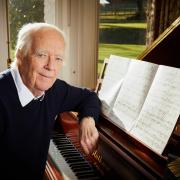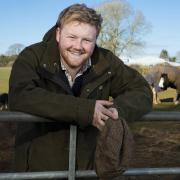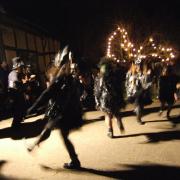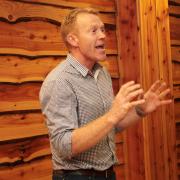How does a man who spent years as an impoverished traveller become a green energy tycoon? Katie Jarvis talks to Dale Vince
If you were going to make a film of Dale Vince’s life (*Thinks* maybe Tom Hanks… And I’m going for Soderbergh directing), here’s the opening scene.
The setting: Grafham Water, a reservoir in Cambridgeshire, which shimmers ultra-marine when the sun rises. Later, in the quiet of a spring night, you’ll hear amorous nightingales a-courting. As the seasons wear on, winter tourists fly in: wild swans, bittern and Little Egrets. Plump trout flicker beneath the wavelets.
On this particular night, the air is weary with cold. It’s late, and the water – sometimes churned by high winds; sometimes millpond calm – is deadly still; frozen, in fact, to stillness.

It’s 1984, and 22-year-old Dale Vince is living a peripatetic life. A life pursued by the law – he and his fellow travellers are being evicted from Molesworth, intended by the MOD as a cruise missile base. In defiance, a Rainbow Village has formed: anti-war; anti-nuclear.
It’s close to midnight when a myriad synchronised headlights appear, circling round the camp: it’s the police and army issuing an (unusually civilised, in fact) ‘invitation’ to leave. The other-worldliness of the experience – lights like encroaching animal eyes – is made more surreal for many of the travellers by recreational chemicals: ‘tripping’, in the vernacular.
Yes, these travellers are leading a lifestyle pursued by the law; yet, in many ways, strangely immune to it.
But hold on.
If you think the excitement of the eviction is the cinematic opening I’m after, then, no. (Not even the part where Michael Heseltine (at the time, Secretary of State for Defence) descends from a helicopter in the early hours of the eviction, face fully made up for camera.)
No. My opening scene takes place a little later, when Dale and friends have moved to Grafham, one of the first places they stop after being forced out of Molesworth. As described: it’s late at night; the lake is frozen; and Dale begins to walk out onto its glassy surface. Not just a little way; not just delicately to test the strength of the ice.
He’s feeling confident. Overconfident, maybe.
‘Looking for the edge of things’ is how he describes it.
So he walks and walks. Why?
Good question.
‘…once I got a long way out, with little else to do, I lifted my leg and brought it down hard on the ice. I didn’t think it through, just did it. …there was nobody around. In response the ice just started cracking.’
As he – now much more carefully – makes his way back to safety, the cracking ice chases his every step.

WE’RE LIVING in times of crisis. No dodging that bullet.
Spiralling energy prices (‘a cost-of-living catastrophe’, the Guardian spells out). Not to mention the biggie: Global warming, where the most optimistic storyline (call me an ostrich) sees Earth heating up by around 1.4C by the end of the century. ‘Hello’ to even more extreme and severe weather and up to two-feet in sea-level rise.
Again, let’s emphasise – that’s the best prediction. And it’s grim.
But what I do find fascinating is where answers might lie.
I defy you not to have heard of Dale Vince: former traveller – or, to put it another way, ‘the enemy within’. (Margaret Thatcher bracketed travellers alongside trade unions and the IRA.)
Dale Vince: UN Climate Champion; green energy pioneer; founder of companies today employing around 800 people.

A man who once lived in a small ambulance (‘My bus had gone to someone that needed it more’); who viewed shoes (whether by necessity or persuasion, I’m unsure) as an optional extra.
A tycoon who nowadays lives in one of Stroud’s most intriguing houses, perched high above the world: an 18th-century neo-castle with views that bounce over glorious limestone grassland across the River Severn and on to Wales.
I mean, how on Earth does anyone make that transition?
Before we go there – and we will – while I have him captive, let’s start by asking him about some of those answers.
About the energy crisis. The one that’s going to send household bills soaring. The one where the people who use least energy – the elderly; the poor – will pay the biggest price.
‘That’s so very true. There are millions of people who are going to struggle to pay their bills and there many millions more who don’t struggle to pay any bills.’
Exactly.
‘Yeah. And it might irritate [the latter] that they have to spend more, but it won’t hurt them.’
Um-hm. So, more expensive energy, in one way, is good. Except that, given the rich are bigger consumers, that isn’t going to get us very far...
Well, Dale Vince isn’t one to sit around simply whinging. He’s a doer.
‘When I leave this conversation,’ he instantly replies, ‘I’m going to flesh out some thoughts and make a new policy proposal; it’s been an idea around for a long time. The idea of an escalating cost-of-energy above a certain consumption level: it might be the answer the Government is looking for and doesn’t know it.’
Blimey. And bravo.

What he’s proposing, almost as we speak, is to make energy very cheap for people who use the least and can afford the least. For everybody else, the more you use, the more you pay. ‘And that would encourage energy efficiency, as well as put the burden where the burden can be better carried.’
But hold your horses/EVs. Would such a policy actually find its way into law? Dale Vince has spoken, many times, about an amorality in business; a lot of people would say there’s an amorality in Government, too.
‘I think that’s fair. I do wonder if they really don’t know or if they just prefer greed over the moral choice and make excuses to themselves about how it’s OK – like with the [Downing Street lockdown] parties. They knew the right thing to do because they set the national rules. But they made exceptions because they’re No 10.’
So, back to the question: Is his energy policy ever likely to be enacted?
To be fair, Dale Vince’s policy suggestions do have form.
A couple of weeks after he proposed a windfall tax on North Sea operators enjoying a £20 billion boost from spiralling gas prices, Labour and Lib Dems adopted it as policy.

That particular tax, some might say, is a no-brainer. Other suggestions are thought-provokingly counterintuitive. He teamed up with the Daily Express last year (yep: the Express) to launch its first green campaign. One initiative was to call for gas boilers to be saved. (I feel I should be writing, ‘SAVED!’ in faux-astonished upper-case tabloid-speak.) The Government, of course, was preparing to pay households to ditch them (gas boilers emitting more than twice the carbon of all gas-fired power stations in the country, according to climate group, Possible). Dale’s solution was that they should be switched to green gas.
‘It [the idea] inflamed what you might call my audience – the more left wing eco-audience. ‘This guy’s gone crazy!’ But I’m making the point that throwing gas boilers out is an uneconomic way to solve the problem.’
He probably hasn’t won too many friends among Greenpeace and Extinction Rebellion, either, by calling them out over meat-eating. A committed vegan himself, his Nailsworth-based Forest Green Rovers was officially recognised as the first ever vegan football club, back in 2017.
‘I was talking to a Greenpeace guy the other day, who was just off to sail on the new ship. I asked, ‘Is it vegan yet?’ He said, ‘Sadly not; we’ve too many volunteers from different countries’ – or some excuse as to why it couldn’t happen.
‘The ship trying to save the world, pontificating about environmental issues, is a meat-eating ship? Come on! Same old, lame old.’
He considers Extinction Rebellion’s stance even more of a contradiction: ‘For me, this is the most recent and most egregious example because it’s taken such a strong stand on environment activism and the need for people to change how they live, blah, blah, blah. ‘To hear one of the founders saying - we were on a platform together at WOMAD – it’s OK; we can still have meat… I was like, wow.’

I’VE INTERVIEWED Dale Vince before. Up on top of a hill in Nympsfield, both of us swaying in a buffeting wind; both of us dwarfed by the immense, ground-breaking, 42-metre-high wind turbine he got permission to build back in 1996.
And – another time – in his Stroud office, surrounded by vibrant staff; he wearing uniform of jeans, earring, and casual ‘Hi’ style.
And, yes, we talked. About his childhood in Norfolk, as conventional as childhoods come. About how, as an adult, he spent years travelling round in old vehicles (ambulances, buses, fire engines), relying on casual jobs – 20 quid a day to break up vehicles in a scrapyard – and the kindness of strangers. About how he ended up living in a caravan in Nympsfield (where that turbine now stands), with a little windmill fixed to the roof to generate his power. And how, gradually, his passion for sustainability began to remake itself in his mind as a green-energy business – Ecotricity – that managed to raise the £400,000 needed to build that first Nympsfield turbine. (Or windmill, as he calls them.)
We talked about all this; but still I felt I knew nothing about him.
I don’t mean he’s secretive or evasive. He’s polite, engaging.
But, no matter how I tried, I couldn’t get my mind round how a man who cared so little about money could morph into the Dale Vince of today, running companies (football, diamonds (sorry – no space to explain; look it up!), school dinners, windmills) with a combined £300 million annual turnover.
And then I read Manifesto, the book he wrote in 2020, all about his life.
Quite a lot is devoted to how he built up his green empire. About his matter-of-principle fights with giants such as Tesla and Thames Water. (NB, the subtitle is: How A Maverick Entrepreneur Took On British Energy And Won.)
And, yes, that’s really interesting.
But I’m most intrigued by his earlier life which – it seems to me – explains not how he physically built a green empire; but – more importantly – how he was mentally equipped to do so.
You’ll have to read it; I don’t have room to say all I’d like to say here. But a few examples.

If you don’t value money for money’s sake, maybe you equally don’t worry about losing it; maybe you’re more ready to take radical business decisions. So – eg – when, as a traveller, he bought an old fire engine in a field for £200, and the owner declared the cash £40 short (‘It wasn’t), Dale paid up. He then, broke as he was, refused £20 the owner’s embarrassed dad tried to press on him (‘because money mattered more to them…’).
The outsider thing is also significant. As a traveller, he was evicted numerous times; disliked – hated – by many. He was also part of a community where radical ideas were the norm. Happy to be despised by the outside world for the sake of his life choices.
‘I wouldn’t precisely call it happy with being despised, but I would absolutely say I’m happy being on the outside; being unaccepted, different. It just doesn’t bother me at all, which I think is a great strength.’
And, thus – I guess – he arrived oven-ready to take on an energy industry where his now-mainstream ideas were first dismissed as cranky.
I do wonder, though, if Dale Vince sometimes misses the joy – the freedom – of having nothing: no possessions; no physical anchor.
If he were to lose everything overnight, would it alter who he is?
He laughs. ‘No.’
Not at all?
‘It would become part of the adventure.’
SO, BACK TO the start. To that anecdote – taken from Manifesto. You can’t get a more cracking (no pun intended) metaphor for your life, I say to Dale Vince, than literally skating on thin ice. (Not bad in terms of melting glaciers, either.) Making an artform of treading where others fear.

But here’s the question: Can a man responsible for nearly 800 employees still skate?
‘I don’t think I would let it get in the way of an important decision and one of principle, like fighting Tesla or Thames Water,’ he says.
Don’t get him wrong. He feels the burden. He cares.
But employees could – in extremis – find other work. Principles would find it harder.
‘I’ve often reminded myself: Look, nobody’s going to die. And that brings perspective.’
For more on Dale Vince and his work, visit zerocarbonista.com




























